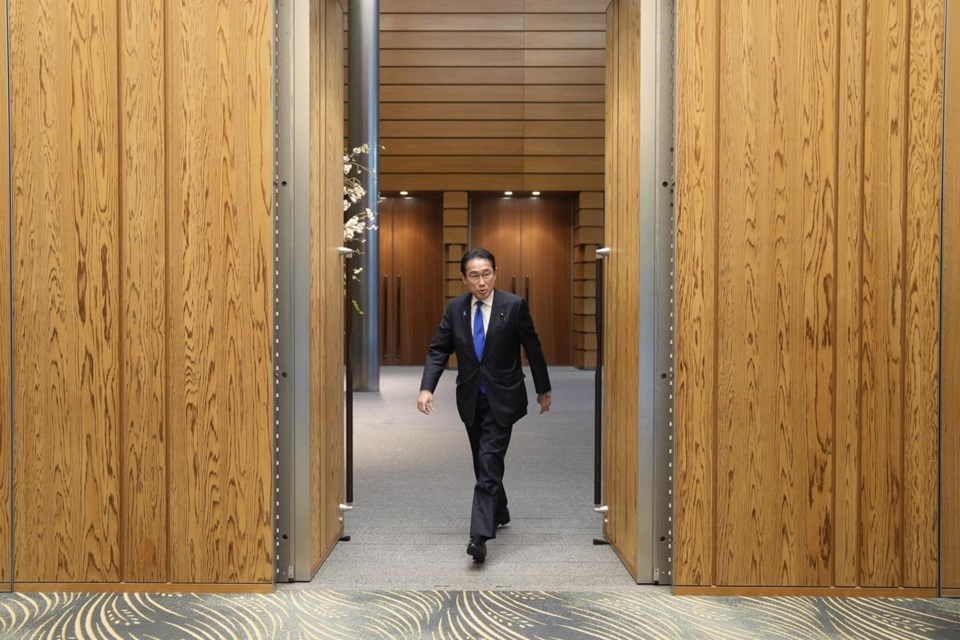TOKYO (AP) — Japanese Prime Minister Fumio Kishida said Friday he wants to strengthen military and weapons development cooperation with the United States as well as with other countries such as the Philippines, as he prepares for a visit to the U.S. next week to meet with President Joe Biden.
“Defense industry cooperation between Japan and the United States, as well as with like-minded countries, are extremely important,” Kishida said in an interview Friday with selected foreign media, including The Associated Press, at the Prime Minister's Office.
“Within the Japan-U.S. alliance, I do hope to steadily improve deterrence and response capability,” he said.
Kishida said Japan hopes to promote security cooperation in areas including defense equipment and technology. “By building multi-layered networks of cooperation, we can further expand and strengthen our deterrence capability,” he said.
During his April 8-14 trip to the U.S., Kishida will hold talks with Biden at the White House on Wednesday, followed by a trilateral summit with Philippine President Ferdinand Marcos Jr. the next day.
Kishida is the first Japanese leader to visit Washington as a state guest since then-Prime Minister Shinzo Abe in 2015, who revised the interpretation of Japan’s pacifist Constitution to allow its self-defense-only principle to also cover its ally, the United States.
Japanese officials hope to showcase a rock-solid Japan-U.S. alliance in a number of areas, but a deepening of security and defense ties and an expansion of arms co-development are expected to top the agenda for Kishida's visit.
Since adopting a more expansive national security strategy in 2022, Kishida's government has taken bold steps to accelerate the country's military buildup and hopes to show it's willing and capable of elevating its security cooperation with the United States. Kishida has pledged to double defense spending and boost deterrence against an increasingly assertive China, which Japan considers a security threat.
Japan, working to acquire what it calls a “counterstrike” capability, has purchased 400 U.S. Tomahawk long-range cruise missiles. After prohibiting almost all weapons exports, it has relaxed export guidelines twice in recent months, allowing the sale of lethal weapons to countries from which they were licensed and overseas sales of a fighter jet it's co-developing with the U.K. and Italy. The changes have also allowed Japan to ship Japanese-made PAC-3 missiles to the United States to help replace those contributed by Washington to Ukraine.
The two leaders are also expected to agree to start discussions on establishing a unified command on each side, seen as a major structural change to enhance interoperability and response capability. They are also expected to agree on a plan to establish a new framework for weapons co-development, and to allow repair and maintenance of U.S. warships in Japan to support their operation in the Western Pacific.
Japan and the United States are both stepping up defense ties with the Philippines over shared concerns about China's role in the region. The three leaders are expected to discuss a strengthening of security cooperation as tensions rise between China and the Philippines over their rival territorial claims in the South China Sea.
Biden during his meeting with Kishida and the trilateral summit wants to show that the three nations are in lockstep in their concerns about increasingly aggressive Chinese action against Philippine coast guard and supply vessels off the disputed Second Thomas Shoal in the South China Sea, according to senior Biden administration official.
The official, who requested anonymity to preview the meetings, said the U.S. is looking to clearly signal to Beijing “that we are three totally aligned maritime democracies who share the same views of how the South China Sea should be governed under international law.”
Another key area of cooperation is space. Kishida and Biden are expected to confirm Japan’s participation in NASA’s Artemis moon program and its contribution of a moon rover developed by Toyota Motor Corp. and the participation of an astronaut. The rover, which comes at a roughly $2 billion cost, is the most expensive contribution to the mission by a non-U.S. partner to date, the official said.
The U.S. and Japan are also expected to announce plans aimed at boosting the number of Japanese students studying at U.S. universities. There has been drop-off in Japanese students in the U.S. in recent years, a trend exacerbated by the COVID pandemic and weakening of the yen.
During his visit, Kishida also plans to highlight Japan’s economic contributions in the United States to gain the understanding of the American public regardless of who wins this year's presidential election. He will meet with business leaders and visit Toyota’s electric vehicle battery factory under construction for a planned launch in 2025 and Honda’s business jet subsidiary in North Carolina.
—
AP writer Aamer Madhani in Washington contributed reporting.
Mari Yamaguchi, The Associated Press

